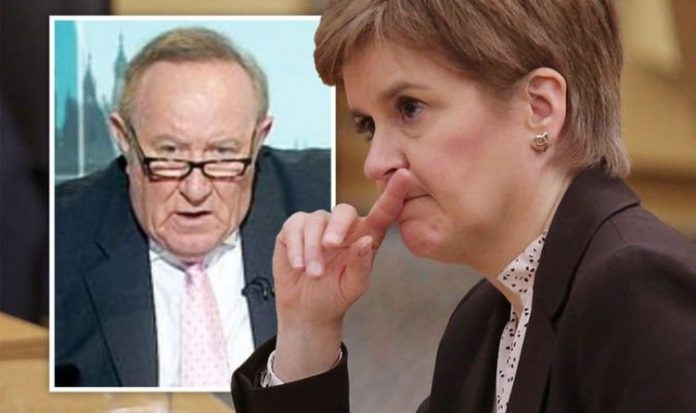Support for Scottish independence continues to grow, according to polling, after 20 consecutive surveys found a Yes vote would come out on top. This has coincided with the Scottish National Party (SNP) looking poised for a dominant display in the year’s Holyrood elections. Britain Elect’s polling projects the SNP, led by First Minister Nicola Sturgeon, will win 53 percent of the vote. This gives them a 32 point lead over their nearest rivals – the Scottish Conservatives – while Scottish Labour also looks set to struggle following Richard Leonard’s resignation.
An election win could force the Government in Westminster to allow a referendum on its place within the UK, as it did in 2014 after the SNP’s dominant 2011 victory.
But as Mr Neil highlighted highlighted before the 2017 general election, Ms Sturgeon’s independence plan has been the subject of heated debate due to its potential economic impacts.
The journalist took the Scottish First Minister to task at the time, claiming independence could cause a “financial disaster” in Scotland.
Mr Neil said: “The Scottish economy is now growing at less than a quarter of the pace of the UK economy, it could be on the brink of recession.
“Don’t you think that you should end your obsession with independence and start generating some growth in Scotland?”
Ms Sturgeon responded by pinning Scotland’s economic challenges on the decline of oil prices.
She said: “Yes, we’ve seen some growth slow – the UK as a whole has seen growth slowing.
“We’ve also had the issues with North Sea oil and gas, which has fed through the Scottish supply chain.”
The SNP offered its economic projections in 2013, based on Scottish government models, which suggested oil prices would be broadly stable for at least two years.
However, the price of crude oil plunged in the second half of 2014, as the independence referendum reached its climax, nearly halving from £86 per barrel in June of that year to £43 in December.
The situation worsened in 2016 as prices dipped to as low as £21 before rising back up to £58 in 2018.
READ MORE: Sturgeon’s independence ‘in tatters’ after £12bn ‘black hole’
Oil was heralded as a cornerstone of an independent Scotland’s economy, but the decline left other parties demanding Ms Sturgeon “apologise” for a “£30billion black hole” in the Scottish economy.
Scottish Labour’s Jackie Baillie MSP said: “The SNP told voters that Scotland was on the cusp of a second oil boom, and that oil was simply a bonus when it came to the costs of independence. That was simply a lie.
“Instead, the figures that Nicola Sturgeon campaigned on have a £30billion black hole in them.
“That would have led to turbo-charged austerity on an unprecedented scale, with huge cuts to schools, hospitals and social welfare programmes.
“These figures were baked into the promises the SNP made to some of the poorest communities in our country. It was nothing more than snake oil.”
DON’T MISS
Nicola Sturgeon faces backlash: ‘UK bailed Scotland out’ [INSIGHT]
Gordon Brown blamed for Scottish independence ‘mess’ [ANALYSIS]
Sturgeon silenced by Supreme Court: ‘No fishing power’ [INSIGHT]
Ms Sturgeon and her party are currently trying to gain the powers to hold a second referendum – a reserved power for Westminster.
Public law expert Professor Aileen McHarg told Express.co.uk last year that an SNP election win could go a long way to securing IndyRef2.
He said: “The growth in support does not change the legal arguments. Either they have the power or they don’t – a mandate makes no difference.
“The reason a mandate is important though is because in 2011, when the SNP last won an overall majority, David Cameron’s agreement to facilitate a referendum at that point had a mandate.
“So the SNP will make it absolutely abundantly clear in their manifesto next year that they want a second referendum.
“If the SNP then gets an overall majority in May, then it will be difficult to dispute that mandate, but that’s a political argument.
“It doesn’t affect the legal argument, a mandate on its own can’t impact the powers of a devolved legislature.”







